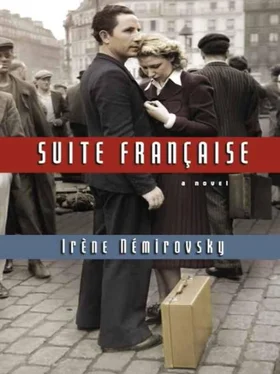Irène Némirovsky - Suite Française
Здесь есть возможность читать онлайн «Irène Némirovsky - Suite Française» весь текст электронной книги совершенно бесплатно (целиком полную версию без сокращений). В некоторых случаях можно слушать аудио, скачать через торрент в формате fb2 и присутствует краткое содержание. Жанр: Историческая проза, на английском языке. Описание произведения, (предисловие) а так же отзывы посетителей доступны на портале библиотеки ЛибКат.
- Название:Suite Française
- Автор:
- Жанр:
- Год:неизвестен
- ISBN:нет данных
- Рейтинг книги:4 / 5. Голосов: 1
-
Избранное:Добавить в избранное
- Отзывы:
-
Ваша оценка:
- 80
- 1
- 2
- 3
- 4
- 5
Suite Française: краткое содержание, описание и аннотация
Предлагаем к чтению аннотацию, описание, краткое содержание или предисловие (зависит от того, что написал сам автор книги «Suite Française»). Если вы не нашли необходимую информацию о книге — напишите в комментариях, мы постараемся отыскать её.
"A book of exceptional literary quality… it has the kind of intimacy found in the diary of Anne Frank."-The Times Literary Supplement
"Heroic… a novel about a nightmare in which the author is entirely embedded."-ANITA BROOKNER, The Spectator
"An exceptionally forceful and frank testimony… a real find. A masterpiece."-L'Express
"Remarkable as the story of the publication of Suite Française is, it will finally be of anecdotal interest compared with the importance of the book. Here is the work of a fine novelist at the top of her form, writing about the fate of her adopted country with a pitiless clarity."-Evening Standard
Suite Française — читать онлайн бесплатно полную книгу (весь текст) целиком
Ниже представлен текст книги, разбитый по страницам. Система сохранения места последней прочитанной страницы, позволяет с удобством читать онлайн бесплатно книгу «Suite Française», без необходимости каждый раз заново искать на чём Вы остановились. Поставьте закладку, и сможете в любой момент перейти на страницу, на которой закончили чтение.
Интервал:
Закладка:
Just as farmers used to be given the names of the places where they lived, to such an extent that the postman who was a descendant of former tenant farmers on the Montmort estate was called Auguste de Montmort to this very day, so the Germans more or less inherited the social status of their landlords. They were called the Durands' Fritz, the La Forges' Ewald, the Angelliers' Bruno.
Bruno rode at the head of his cavalry detachment. The well-fed, fiery animals pranced and eyed the onlookers with pride and impatience; they were the envy of the villagers.
"Mama, did you see?" the children shouted.
The Lieutenant's horse had a golden-brown coat, as glossy as satin. Both horse and rider were aware of the cheers, the women's cries of pleasure. The handsome animal arched its neck, violently shook its bit. The officer smiled faintly and sometimes made a little affectionate smacking sound with his lips, which controlled the horse better than the whip. When a young girl, at a window, exclaimed, "He's a good rider, that Boche, he is," he raised his gloved hand to his helmet and solemnly saluted.
Behind the young girl you could hear nervous whispering.
"You know very well they don't like being called that. Are you crazy?"
"Oh, so what! So I forgot," the young girl retorted, red as a cherry.
The detachment broke ranks at the village square. In a great clanking of boots and spurs, the men went back to their billets. The sun was shining and it was hot now, almost like summer. The soldiers got washed in the courtyards; their naked torsos were red, burned by being outdoors so much, and covered with sweat. One soldier had hooked a mirror on to the branch of a tree and was shaving. Another plunged his head and bare arms into a large tub of cool water. A third called out to a young woman, "Beautiful day, Madame!"
"Well now, so you speak French?"
"A little."
They looked at each other; smiled at each other. The women went over to the wells and sent down their buckets on long creaking chains. Once retrieved and full of shimmering, icy water that reflected the dark blue of the sky, these buckets always attracted a soldier, who would hurry over to take the heavy burden. Some of the soldiers did it to prove that, even though they were German, they were polite; others did it out of natural kindness; some because the beautiful day and a kind of physical invigoration (brought on by the fresh air, healthy tiredness and the prospect of a well-earned rest) put them in a state of exaltation, of inner strength-a state where men who would gladly act maliciously towards the strong feel even more kindly towards the weak (the same state, doubtless, that in spring causes male animals to fight one another yet graze, play and gambol in the dust in front of the females). A soldier walked a young woman home, solemnly carrying two bottles of white wine she had just pulled out of the well. He was a very young man with light-blue eyes, a turned-up nose, large strong arms.
"They're nice," he said, looking at the woman's legs, "they're nice, Madame…"
"Shh… My husband…"
"Ah, husband, böse … bad," he exclaimed, pretending to be very frightened.
The husband was listening behind the closed door and, since he trusted his wife, instead of getting angry he felt rather proud. "Well, our women are beautiful," he thought. And the small glass of white wine he had every morning seemed to taste better.
Some soldiers went into the shoemaker's. He was a disabled war veteran who had his workbench in the shop; the deep, natural aroma of fresh wood hung in the air; the freshly cut blocks of pine still shed tears of sap. The shelves were crammed with hand-carved clogs decorated with all manner of patterns-chimera, snakes, bulls' heads. There was a pair in the shape of a pig's snout.
One of the Germans looked at them appreciatively. "Magnificent work," he said.
The morose, taciturn shoemaker didn't reply, but his wife, who was setting the table, was so curious she couldn't help but ask, "What did you do in Germany?"
At first the soldier didn't understand; then he said he'd been a locksmith. The shoemaker's wife thought for a moment, then whispered in her husband's ear, "We should show him that broken key to the dresser. Maybe he could fix it…"
"Forget it," her husband said, frowning.
"You? Lunch?" the soldier continued. He pointed to the white bread on a plate decorated with flowers: "French bread… light… not in stomach… nothing…"
What he meant was that the bread didn't seem nourishing, wouldn't fill you up, but the French couldn't believe anyone would be crazy enough not to recognise the excellence of their food, especially their golden round loaves, their crown-shaped breads. There were rumours they would soon have to be made with a mixture of bran and poor-quality flour. But no one believed it. They took the German's words as a compliment and were flattered. Even the sour expression on the shoemaker's face softened. He sat down at the table with his family. The Germans sat on wooden stools, at a distance.
"And do you like this village?" the shoemaker's wife continued.
She was naturally sociable and suffered from her husband's long silences.
"Oh, yes, beautiful…"
"And what about where you come from? Is it like here?" she asked another soldier.
The soldier's face began quivering; you could tell he was desperately trying to find the words to describe his own land, the fields of hop and deep forests. But he couldn't find the words; he just spread out his arms. "Big… good earth…" He hesitated and sighed. "Far…"
"Do you have a family?"
He nodded yes.
"You don't need to talk to them," the shoemaker said to his wife.
The woman felt ashamed. She continued working in silence, pouring the coffee, cutting the children's sandwiches. They could hear joyful sounds coming from outside. It was the cheerful din of laughter, weapons rattling, soldiers' voices and footsteps. No one quite knew why, but they felt lighthearted. Maybe it was because of the beautiful weather. The sky, so blue, seemed gently to bow down towards the horizon and caress the earth. The hens were squatting in the dust: every so often they made sleepy squawking sounds and fluffed themselves up. Bits of straw, feathers, invisible grains of pollen floated in the air. It was nesting season.
There had been no men in the village for so long that even these soldiers, the invaders, seemed in their rightful place. The invaders felt it too; they stretched out in the sunshine. The mothers of prisoners or soldiers killed in the war looked at them and begged God to curse them, but the young women just looked at them.
7
In one of the classrooms of the independent school, the ladies of the village and some of the fat farmers' wives from the surrounding countryside had gathered together for the monthly "Packages for Prisoners" meeting. The village had taken responsibility for local children of prisoners of war who had been on welfare before the war. The Charity's President was the Viscountess de Montmort. She was a shy, ugly young woman who got flustered whenever she had to speak in public. On each occasion she stuttered; her hands would sweat; her legs trembled; in short, she was just as prone to stage fright as any member of the aristocracy. But she felt it was an obligation, that it was her personal responsibility, her vocation, to enlighten the peasants and middle classes, to show them the way, to plant the seed of righteousness within them.
"You see, Amaury," she explained to her husband, "I cannot believe there is any essential difference between them and me. Even though they disappoint me (if you only knew how crude and petty they can be!), nevertheless I persist in trying to find some spark within them. Yes," she added, looking up at him with tears in her eyes-she cried easily-"yes, our Lord would not have died for such souls if there had been nothing inside them… But their ignorance, my dear, they are steeped in such ignorance that it is truly frightening. So at the beginning of each meeting, I give them a little talk to help them understand why they are being punished and (go ahead and laugh, Amaury) I have sometimes seen a glimmer of understanding on their chubby faces. I do regret," the Viscountess thoughtfully concluded, "I do regret not having followed my vocation: I would have enjoyed preaching in an isolated region, working alongside some missionary in a savannah or virgin forest. Well, best not to think about it. Our mission is here where the Good Lord has sent us."
Читать дальшеИнтервал:
Закладка:
Похожие книги на «Suite Française»
Представляем Вашему вниманию похожие книги на «Suite Française» списком для выбора. Мы отобрали схожую по названию и смыслу литературу в надежде предоставить читателям больше вариантов отыскать новые, интересные, ещё непрочитанные произведения.
Обсуждение, отзывы о книге «Suite Française» и просто собственные мнения читателей. Оставьте ваши комментарии, напишите, что Вы думаете о произведении, его смысле или главных героях. Укажите что конкретно понравилось, а что нет, и почему Вы так считаете.

![Константин Бальмонт - Константин Бальмонт и поэзия французского языка/Konstantin Balmont et la poésie de langue française [билингва ru-fr]](/books/60875/konstantin-balmont-konstantin-balmont-i-poeziya-francuzskogo-yazyka-konstantin-balmont-et-thumb.webp)










